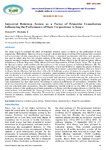| dc.description.abstract | The study sought to establish the effect of Industrial relations system in Kenya on the performance of state
corporations. Methodology: Data was obtained through a descriptive design involving 279 employees both unionized
and non-unionized of state corporations in Nairobi County. A structured questionnaire with likert scale questions
was used to collect data from the selected subjects of the study. Interviews were also conducted with human
resource managers/ employee relations officers, shop floor union officials, officers of the Ministry of Labour, officers
of Federation of Kenya Employers (FKE), officers of Central Organizations of Trade Unions, Kenya. The study used
the Dunlop’s systems model credited with the application of the systems approach to Industrial Relations (IR). The
model explains the input acquisition, input transformation, output and feedback to explain the process of Kenyan
Industrial Relations System. Finding: The study found that there existed a prescribed Industrial Relations System
in Kenya, but its adherence had been faced with a lot of challenges namely, reluctance to recognize trade unions,
delay in conclusion of collective agreement, and partial implementation of collective agreements resulting to high
rate of industrial actions in the country and delayed settlement of cases submitted to the industrial court. Besides,
tripartite consultation as the study's intervening variable had intervened positively enhancing the performance of
state corporations. Moreover, partnership approaches such as training, harmonization of partners' interests and
high commitment had been experienced, translating to enhanced performance of organizations. Limitation: The
study was concentrated in unionised state corporations and therefore cannot be generalized in the private sector
and non unionised state corporations. Practical implications: provide evidence on the effect of the industrial
relations system on tyhe performance of state corporations in Kenya and offer recommendations on what the three
social partners and specifically the Kenya government needed to do to improve effectiveness of the industrial
relations system in the country. Originality: This is the first study of this nature to be conducted in Nairobi County
focusing on industrial relations system and intervention of tripartite consultation in the performance of state
corporations. | en_US |

